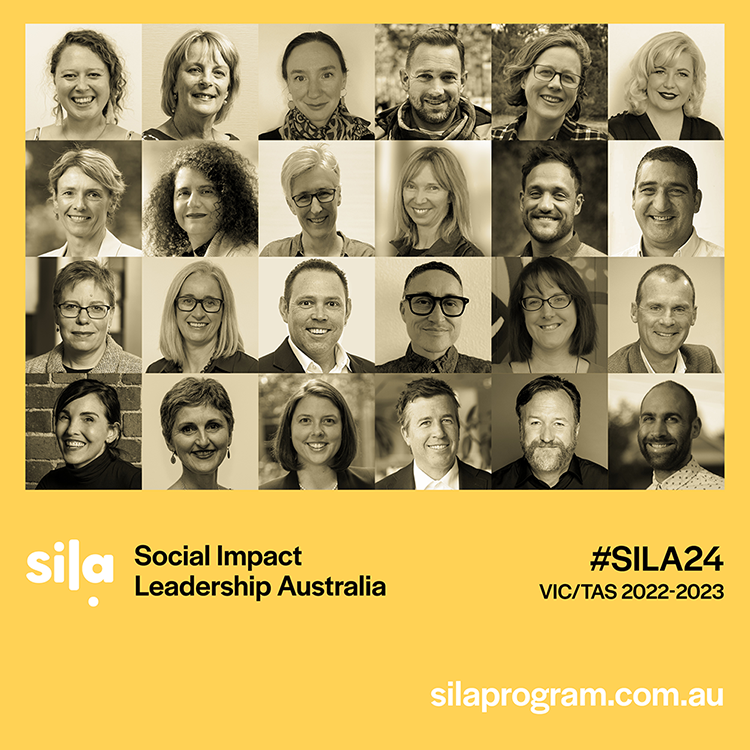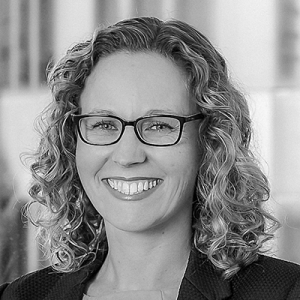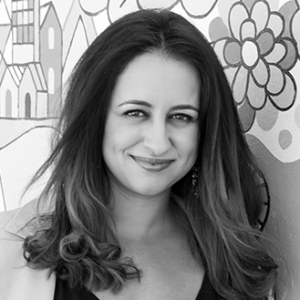Monday, 25 July 2022
Twenty-four not-for-profit leaders have been announced today as participants in the second cohort of the Social Impact Leadership Australia (SILA) Program – a five-year $9.6 million capacity building and leadership program funded by four of Australia’s major philanthropic foundations.
Built from a collective desire to support NFP leaders to positively influence their organisations and create a strategic network of more than 100 social impact leaders across the country, The Myer Foundation, Sidney Myer Fund, Vincent Fairfax Family Foundation and Paul Ramsay Foundation came together in 2020 to fund the SILA Program, which is being delivered by the Centre for Social Impact (CSI).
Cohort Two participants – made up of CEOs from Victoria and Tasmania within the climate, arts, agriculture, health and community services sectors – will experience a series of immersive learning experiences, one-on-one coaching, dedicated capacity-building support, and a fully funded three-month sabbatical over the 10-month program.
Arminé Nalbandian, CEO of CSI, said the SILA Program aims to strengthen the entire for-purpose sector through its innovative and immersive approach – an Australian-first and fully funded offering.
“SILA is a groundbreaking program that recognises the importance of investing in for-purpose leaders. Corporate leaders have long had opportunities for intensive professional support and SILA is a way for us to provide those same opportunities to for-purpose leaders,” she said.
“As Australia’s leader in social impact education we’re proud to be delivering this flagship for-purpose executive leadership program.”
Leonard Vary, CEO of The Myer Foundation and Sidney Myer Fund, doubled-down on the importance of SILA to prop up the underinvestment in tailored executive professional development within the for-purpose sector.
“The for-purpose sector is crucial to communities all across the country and we must continue to drive best-practice leadership. We are proud to be supporting this second cohort of experienced leaders who are working to find solutions for climate action, community arts, family violence, and more,” he said.
“We know from Cohort One and the CEOs who have already experienced the program, that SILA will strengthen this new cohort’s professional networks and equip them with the latest leadership skills to manage complex organisational change and collaboration beyond completion of the program.”
On being selected as a SILA Cohort Two participant, Bill Mithen, CEO of the Give Where You Live Foundation in Geelong, Victoria celebrated the program for its disruptive and evidence-based approach to developing leadership capability.
“I think we all inherently know that we’re at our best and most creative as leaders when we stop to consider all the angles and possibilities, but too often the daily imperatives don’t allow that. Getting the time to slow down, think and imagine is an exciting prospect which can only lead to greater impact.
“Leadership in smaller organisations often rests with the CEO and SILA provides a rare opportunity for us to take a breath and develop a more diverse breadth of leadership capability.”
As part of SILA, participants will complete a tailored sabbatical enabling time to reflect and apply learnings from the program while their organisation receives capacity funding and executive support through an identified ‘Step-up Leader’.
Jo Flanagan, CEO of Women’s Health Tasmania and another Cohort Two participant, is looking forward to building her own capacity, but also her Deputy CEO’s:
“SILA is more than just a leadership program. It has an emphasis on organisational capability as well as individual leadership and is an amazing opportunity to develop my own skills and knowledge, and those of our Deputy CEO, who will be our SILA step-up leader. I’m hoping it will really help my organisation position itself strategically for the next 10 years.”
The SILA Program’s Cohort Two participants include:
| Name | Organisation |
| Adrienne Picone | TasCOSS |
| Aileen Ashford | Kids First Australia |
| Alison Lai | Alcohol, Tobacco and other Drugs Council Tasmania |
| Andrea Goddard | Stars Foundation |
| Andrew Davies | B Lab Australia and Aotearoa New Zealand |
| Bill Mithen | Give Where You Live Foundation |
| Charlotte Jones | Mental Health Legal Centre |
| Chris Povey | Justice Connect |
| Daniel Santangeli | Footscray Community Arts |
| Donna deZwart | Fitted for Work |
| Elisa Buggy | Western Region Centre Against Sexual Assault Inc (WestCASA) |
| Fiona Davis | Farmers for Climate Action |
| Jaison Hoernel | Good Cycles Inc |
| James Hattam | Tasmanian Land Conservancy |
| Jane Hunt | The Front Project |
| Jo Flanagan | Women’s Health Tasmania |
| Kirsty Albion | Centre for Australian Progress |
| Melodie Potts Rosevear | Teach for Australia |
| Michael Kelly | Relationships Australia Tasmania |
| Natalie Egleton | Foundation for Regional & Rural Renewal (FRRR) |
| Sam La Rocca | The Sunrise Project |
| Sarah Neal | Malthouse Theatre |
| Simon Ruth | Thorne Harbour Health (Victorian AIDS Council Inc) |
| Tania Farha | Safe and Equal |
Participants in Cohort One (2021) were selected from NSW and the ACT, with SILA being offered to for-purpose leaders from all states and territories in Australia in a staggered roll-out. Nominations for the third intake will open in late 2023.



